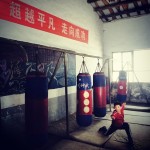I wrote a story a while back about pirates and militias, and the role of the martial artist, in certain time periods, as a guardian. This idea has been with me for a very long time, due perhaps to my love of fantasy novels. The story of the hero who protects the village, or slays the dragon, is an old one, and I also touched on that cycle in a post on this blog, “Mixed Martial Arts and the Hero’s Journey.”
I wrote the former essay during the media frenzy following the shooting of Michael Brown in Ferguson, Missouri. After that shooting, it seemed as if every day another report about police shooting unarmed men – mostly black, a few white – came tumbling through my social media feeds. In each report, police aggression was clear and apparent. The police seemed eager to pull the trigger, eager to escalate the situation. As if they had been waiting for this opportunity for some time, and now finally had the chance to “fuck someone up” – I found myself more and more drawn to the fantasy of a militia with morals, with a code, with the discipline of a master, or an MMA fighter … a force made up of people who used force so often, in controlled settings, that the tendency to escalate a situation has been beaten out of them so to say.







